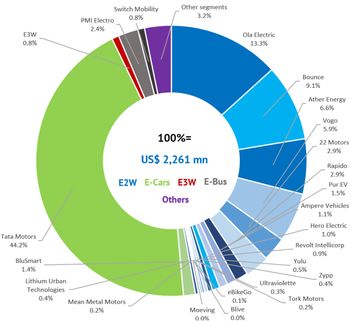Tata Motors: Slowly making its way to the future
After a decade of ups and downs, TaMo has slowly scripted an impressive return to the Indian auto sector. Once considered a laggard with eroding market share and no future potential, the company has not just shown signs of recovery but has taken the market by storm. The shares of TaMo are red-hot even after giving a 193% return in the last 12 months. Before we jump into the matter, let us look at the performance of TATA Motors compared to its listed peers in the auto sector.
While many factors are attributed to this outperformance, we look at TaMo's investments in the EV segment, which has invigorated investors' interest in the loss-making company.
Traditionally, TaMo has aggressively invested in innovation and has dared to explore untested waters in the risky Auto sector. Launching Tata Safari when there was hardly any SUV in the Indian market to fulfilling its promise of offering "The World's Cheapest Car," the TATAs have experimented and learned some tough lessons to run their auto business.
The auto giant has been an early mover in laying the foundations for the highly anticipated EV segment, which is being seen as a possible turnaround story for the company. On the one hand, players such as Maruti Suzuki and Mahindra Ltd. are expanding their portfolio of diesel-petrol vehicles; TaMo has already launched electric passenger cars and is commanding a heavy 75% market share in the Indian EV market. Moreover, It is also not shying away in raising capital for the investment heavy segment. A few weeks back, it raised $1 billion from private equity funds for the R&D and other required investments, which remains one of the firsts in the EV ecosystem.
While it is too early to declare the winners, the company has definitely progressed in tapping the new market early on. Let's look at some of the reasons which may help Tata Motors in becoming the leader of the pack in the future:
1. So far, the other big automakers have been reluctant to corner funds for EV and are still figuring out the risks involved. TaMo, however, has been making strides with record sales of its newly launched Nexons and Tigors. The point is, TaMo enjoys a huge first-mover advantage and will have a superior portfolio till the competition catches on. Maruti Suzuki, which accounts for half of all the car sales in India, plans to launch EVs only after 2025.
2. Not just the vehicles, TaMo is leveraging all it can from other subsidiaries of TATA Group. Going by the reported numbers, TATA POWER has already installed 1000 EV charging points across the big cities and has big plans to invest in charging infrastructures along the highways.
3. While all of us dream of driving Tesla one day, the government policies on the import of EVs make it hard to realize. With no plans to lift the duties anytime soon, the government is expected to give enough time for Indian companies to get seasoned up in the business before competing with foreign automakers.
4. The rising fuel prices have already caused a lot of hysteria among the masses. The price of crude oil has skyrocketed in the past few months, and there is no end in sight. OPEC, along with Russia, has made its intentions clear by reluctance shown in increasing the supplies. This will be a factor to look upon for the price-sensitive car-buyers who might consider shifting to TATA's affordable EVs.
While the domestic EV space definitely looks promising for TATA Motors, we are sure that TaMo is looking at the opportunities available across the borders as well. As the countries pledge towards going Carbon-neutral in the next 50 years, the global auto industry will be a space to watch out for.
❮
❯


